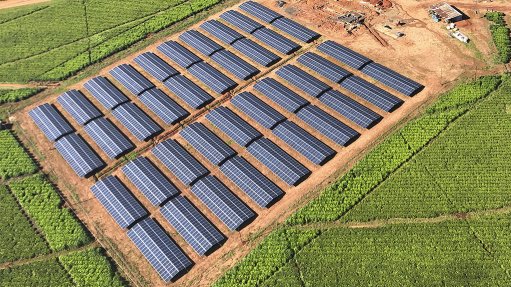
OFF GRID The hybrid solar installation installed by Blockpower SA and Dhybrid was tailor made for the client in Zimbabwe
The active partnership between South Africa-based solar solutions provider Blockpower SA and German-managed microgrid integrator Dhybrid has resulted in the completion of a 1.4 MWp, 1 MVA, 480 kWh hybrid solar system at an agriculture estate, in Zimbabwe.
The Tanganda Tea Company, which operates several agriculture estates in the Chipinge district, procured the services of Blockpower to install a hybrid solar solution for its tea processing plant.
Blockpower was tasked with the design, supply, installation, implementation and commissioning of the hybrid solar system; Dhybrid managed the microgrid integration and lithium-ion storage solutions.
“Blockpower designed a unique solution, tailor-made for local conditions that is also eco-friendly,” says Blockpower MD Kyle Bohnsack.
The project started in April last year and was completed in June this year, and
entailed the installation of a solar photovoltaic (PV) plant, inverters, a battery storage system and a main distribution board.
The PV plant consists of ground-mounted PV panels in an east-west configuration on structures designed for solar panels.
The Huawei 60 kW grid-tied inverter selected for the project converts direct current into alternating current.
The selected battery storage system includes a 480 kWh battery, stacked in racks, manufactured by a multinational company, as well as a 1 MVA inverter, installed in a locally assembled climate-controlled container.
“The main distribution board combines and regulates the power gained from the solar plant, batteries and generators to feed the required load of the processing plant,” says Bohnsack.
The system is monitored and controlled using the Dhybrid universal power platform, which is installed in the climate-controlled container alongside the operator’s supervisory control and data acquisition, or Scada, system.
The cooperation agreement between the companies is the result of their having a real interest in developing new opportunities in the renewable energy sector at a more rapid rate.
In South Africa, Blockpower “has boots on the ground”, while Dhybrid can provide technology to best leverage most of the opportunities.
“The relationship entails our partner supplying some of the technology and Blockpower integrating the technology and deploying it to complete an installation for clients,” adds Bohnsack.
Meanwhile, besides the initial financial layout, Blockpower had to deal with the challenge of the project having broken ground when the first Covid-19 lockdown was implemented in South Africa in March last year.
“This, in turn, created a range of logistical challenges, as well as the challenge of not having staff available on site, owing to various restrictions,” notes Bohnsack.
Blockpower and Dhybrid agreed to focus on the health and safety of staff and devised a working plan to balance working on the project remotely and on site.
Moving Forward
“There has been a substantial uptick in hybrid solar solutions, especially from the commercial and industrial sectors, enthuses Bohnsack.
“We have seen through research that the interest in solar and hybrid power supplies has increased significantly in the past six to nine months.
Blockpower believes that the solar industry in South Africa has the potential to lead the way in supplying Africa with reliable power.
“Notably, the ideal system for Africa is hybrid renewable energy, as this allows for full energy generation and storage use, which is flexible and sustainable.”
Bohnsack concludes that Blockpower hybrid systems can be scaled to suit large industrial sites or smaller residential sites, sustaining a reliable power system for all clients.